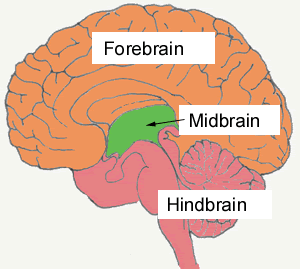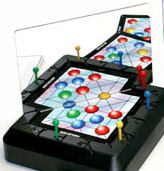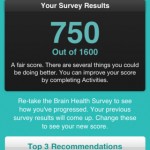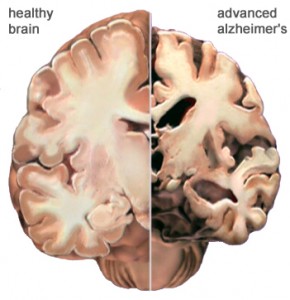 The purpose of the Next Brain Blog is to explore ways to enhance brain function and improve cognitive performance. The blog is dedicated to exploring all ways of improving learning, decision-making, creativity, memory, levels of mental energy, pattern recognition, embodied cognition and all things mental. Nature gave us a hindbrain, midbrain and forebrain to deal with challenges in the environment. Optimistically, this blog assumes that we have the science, technology, drugs and training methods to take over where nature left off and create a Next Brain.
The purpose of the Next Brain Blog is to explore ways to enhance brain function and improve cognitive performance. The blog is dedicated to exploring all ways of improving learning, decision-making, creativity, memory, levels of mental energy, pattern recognition, embodied cognition and all things mental. Nature gave us a hindbrain, midbrain and forebrain to deal with challenges in the environment. Optimistically, this blog assumes that we have the science, technology, drugs and training methods to take over where nature left off and create a Next Brain.
But is cognitive enhancement necessarily a good thing? An interesting new article, Why Aren’t We Smarter Already: Evolutionary Trade-0ffs and Cognitive Enhancements suggest that perhaps it is not. The article points out that:

- Having a bigger brain means a baby’s head might not make it through a mother’s pelvis region leading to increases in infant mortality
- Cognition enhancing drugs such as Ritalin can cause poorer performance in individuals with normal attention levels and may interfere with some tasks such as driving because they cause us to over focus on the wrong things
- Having a super sharp or extraordinary memory seems to correlate to leading a difficult life and would certainty magnify the effects of trauma
- Very high IQ individuals may be more prone to genetic nervous system disorders.
The authors argue that our brains are in a natural balance with other parts of our bodies and the environment. Radical improvements in any aspect of cognition throws us out of balance and results in problems. While such fundamental trade-offs might make a supermind or megamind unlikely, the authors point out:
“If you have a specific task that requires more memory or more speed or more accuracy or whatever, then you could potentially take an enhancer that increases your capacity for that task,” he says. “But it would be wrong to think that this is going to improve your abilities all across the board.”
While interventions that are strong enough to create radical cognitive improvements are some time off, the article does begin to develop a framework for a deeper understanding of the issues and limitations associated with our ambition for bigger better brains.
 Fat Brain offers an amazing collection of high quality toys and entertainments designed to stimulate the brain and develop cognition. You can shop for toys by gender and ages ranging from 1 year old to 18 years old. From magnetic poetry and brain food (colorful goo) to the best selling stomp rockets and reflections (image shown), a truly unique game that combines mirrors, visual illusion and competition.
Fat Brain offers an amazing collection of high quality toys and entertainments designed to stimulate the brain and develop cognition. You can shop for toys by gender and ages ranging from 1 year old to 18 years old. From magnetic poetry and brain food (colorful goo) to the best selling stomp rockets and reflections (image shown), a truly unique game that combines mirrors, visual illusion and competition.
Just the kind of toys that should be on the holiday shopping list of Next Brain Blog readers. Interested to hear from anyone that has purchased or plays with Fat Brain Toys. How are they making you smarter?
 The answer is yes according to the makers of SingFit an App for the iPhone and iPad that is due out in just a couple of weeks. Grounded in well-established principles from music therapy they claim:
The answer is yes according to the makers of SingFit an App for the iPhone and iPad that is due out in just a couple of weeks. Grounded in well-established principles from music therapy they claim:
“Scientific studies have shown that singing in general positively impacts the levels of hormones responsible for regulating mood, blood pressure and social bonding, including serotonin, cortisol and oxytocin. Furthermore, singing has been proven to help increase immune system strength and respiratory function while decreasing stress, pain and agitation. Imaging studies also reveal that singing can promote cross hemisphere brain activity, which can increase mental neuroplasticity and improve cognitive functioning.”
The app is free but they hope to sell you a $13 a month subscription for more content. I’d like to hear from readers that use this app or other forms of music therapy to build brain function and improve cognitive performance.
 Do you have an iPhone or iPad and want to lower your risk of Alzheimer’s disease or other forms of dementia? Check out the the free BrainyApp. It let’s you apply the latest neuroscience to assess your risk and develop recommendations for keeping your brain and heart healthy.
Do you have an iPhone or iPad and want to lower your risk of Alzheimer’s disease or other forms of dementia? Check out the the free BrainyApp. It let’s you apply the latest neuroscience to assess your risk and develop recommendations for keeping your brain and heart healthy.
Not surprisingly the risk factors that the app uses are related to lifestyle and include diet, smoking, blood pressure, weight exercises and lack of mental activity. And the factors work together. For example, one study found that high salt diet combined with inactivity in older adults contributed to cognitive decline.
Interested to hear from readers that have used this app or similar apps to gain insight into how lifestyle choices impact brain health.
 The answer is yes according to recent research at Michigan State University. They studied 500 12-year-olds and found that playing video games increases creativity when it comes to drawing pictures and writing stories. The finding is robust:
The answer is yes according to recent research at Michigan State University. They studied 500 12-year-olds and found that playing video games increases creativity when it comes to drawing pictures and writing stories. The finding is robust:
“… regardless of gender, race or type of game played by the students, the study found a relation between video game playing and greater creativity.”
They also found no increase in creativity through the use of computers, the Internet or smart phones.
Interested to hear from readers that include video game playing in an effort to develop their children’s brain function and cognitive performance.
 For more than 25 years Designation ImagiNation has delivered an after school experience that builds creativity, critical thinking and collaborative problem solving skills in k-12 and university level students in more than 30 countries. Students form small teams of 2-7 members, select an open-ended challenge, learn to generate and test creative solutions and then compete in tournaments. They reach over a 100,000 students a year and the tournaments are a significant event. Check out the 2011 global finals. I’ve included a photo (to the right) from the opening ceremonies in this post.
For more than 25 years Designation ImagiNation has delivered an after school experience that builds creativity, critical thinking and collaborative problem solving skills in k-12 and university level students in more than 30 countries. Students form small teams of 2-7 members, select an open-ended challenge, learn to generate and test creative solutions and then compete in tournaments. They reach over a 100,000 students a year and the tournaments are a significant event. Check out the 2011 global finals. I’ve included a photo (to the right) from the opening ceremonies in this post.
Some challenges include:
- Deliver a theatrical performance on the use of solar energy
- Create a movie trailer with characters from at least two nations
- Design and build a wooden and glue structure that can hold a heavy weigh
Here is the pitch:
“By participating in the team-based competitive program, children can achieve lifelong benefits, improve self confidence, and learn the creative problem solving process and develop critical thinking skills.”
There are plenty of opportunities to start a team, sponsor a team or volunteer.
Interested to hear from readers that have participated in the program. How are they teaching creativity and critical reasoning skills?
Categories:
Child, Problem Solving Tags:

 Working riddles makes you to think. Often you have to think hard or in new ways. Riddles are good at teaching us how to reframe a context, probe deeply on small clues, invert our assumptions and other problem solving heuristics. Some claim they are a great brain training tool. For example, I recently came across Riddles Improve Brain Functionality, Translate to Real-Life Problem Solving Skills, that claims:
Working riddles makes you to think. Often you have to think hard or in new ways. Riddles are good at teaching us how to reframe a context, probe deeply on small clues, invert our assumptions and other problem solving heuristics. Some claim they are a great brain training tool. For example, I recently came across Riddles Improve Brain Functionality, Translate to Real-Life Problem Solving Skills, that claims:
“A daily dose of riddles and brain teasers is one of the most effective ways to exercise the mind. It is proven that by spending just a few minutes a day “playing” improves memory, concentration and reaction time. This improved brain power translates into being more efficient as a parent, student, employee or boss.”
While I have yet to find a scientific study that supports the claim that working riddles significantly improves cognitive performance on everyday tasks, it does seem reasonable.
Try some out. Riddlesly (source of the quote above) is a popular site. Or for $15 you can get visual brainstorms from Marbles the brain store. Visual brainstorms is a deck of 100 cards with riddles of various types of levels.
Interested to hear from readers that use riddles as part of their Next brain training program.
 Cognitive Behavioral Therapy (CBT) has seen a lot of success over the last 25 years. The ideas is that faulty assumptions or patterns of thinking can seriously impair how we learn, make decisions, socialize or otherwise perform cognitive functions. In CBT the therapist works with the patient to surface the faulty pattern of thinking and change it thereby relieving the problems. The tools of CBT have been incorporated in other disciplines such as leadership, design and self improvement.
Cognitive Behavioral Therapy (CBT) has seen a lot of success over the last 25 years. The ideas is that faulty assumptions or patterns of thinking can seriously impair how we learn, make decisions, socialize or otherwise perform cognitive functions. In CBT the therapist works with the patient to surface the faulty pattern of thinking and change it thereby relieving the problems. The tools of CBT have been incorporated in other disciplines such as leadership, design and self improvement.
As a self-improvement approach the individual attempts to surface and alter faulty assumptions pretty much on their own. While the success of the self-improvement approach has not been scientific demonstrated it does seem to have staying power. More and more books, programs and training events are aimed at how individuals can use CBT to manage their owning thinking and improve cognitive performance. Such programs are typically focused on learning:
- The ABC formula (see diagram) or the connection between activating events, the beliefs they generate and the emotional consequent or feeling we have
- How to analyze self talk especially those messages we repeat
- Ways to identify patterns of dysfunctional thinking (e.g. over generalizing or catastrophizing)
- Techniques for modifying the patterns (e.g. confronting and flooding).
For example you can use this approach to identify and mitigate the negative self-talk that stops you from taking action, making a difficult decision or giving a presentation. To explore CBT further you can work through a short online presentation developed by James Porter or check out CBT for Dummies.
Interested to hear from readers that have used CBT by themselves or with a therapist to improve cognitive performance.
Source: ABC Diagram
Music is one of the best ways to charge up your cognitive performance in both the short and long term. What differentiates music from noise or other sounds? It is exactly its ability to authentically move our hearts and extend our minds. Music is brain boosting technology by definition. That’s why in the Next Brain blog we are always on the look out for applications that use music to improve brain function or enhance cognitive performance.
 For example, a new study by The Royal Conservatory of Music in Canada, York University and others showed that students 4-6 years old experience a measurable increase in IQ after just 20 days of music-based cognitive training. The improvement showed up in before and after testing and EEG brain imaging.
For example, a new study by The Royal Conservatory of Music in Canada, York University and others showed that students 4-6 years old experience a measurable increase in IQ after just 20 days of music-based cognitive training. The improvement showed up in before and after testing and EEG brain imaging.
The music-based cognitive training included interactive cartoons that delivered lessons twice each day for one hour. A picture of the cartoon is included in this post. To see more watch a video.
While only one study, the results are significant. An impressive 90% of the 48 students in the study show improvement in verbal intelligence after just 40 hours of training. There was a control group and the differences showed up in an EEG that measure functional brain activity. The effects should be long lasting. For more details check out the press release on the Association of Psychological Science web site.
Interested to hear from readers that use music-based training programs.
 Just read an interesting blog post claiming that the cost of brain disorders in Europe has soared to $1 trillion dollars per year! The post in based on research from the European Brain Council and covers a wide range of issues from strokes and depression to sleep problems and headaches.
Just read an interesting blog post claiming that the cost of brain disorders in Europe has soared to $1 trillion dollars per year! The post in based on research from the European Brain Council and covers a wide range of issues from strokes and depression to sleep problems and headaches.
The lack of brain health is now the most costly of all chronic conditions in Europe even topping heart disease and cancer.
While the article points to tougher regulation on pharmaceutical in Europe as part of the problem, the costs are enormous in the US too.
This signals an urgent need for individual action and behavior change around diet, supplements, exercise, brain training, socializing, personal mood management and the other factors that have proven effective in enhancing and maintaining brain health even as we age.
Image Source: Alzheimer’s Association
Categories:
Cognitive Decline Tags:
 The purpose of the Next Brain Blog is to explore ways to enhance brain function and improve cognitive performance. The blog is dedicated to exploring all ways of improving learning, decision-making, creativity, memory, levels of mental energy, pattern recognition, embodied cognition and all things mental. Nature gave us a hindbrain, midbrain and forebrain to deal with challenges in the environment. Optimistically, this blog assumes that we have the science, technology, drugs and training methods to take over where nature left off and create a Next Brain.
The purpose of the Next Brain Blog is to explore ways to enhance brain function and improve cognitive performance. The blog is dedicated to exploring all ways of improving learning, decision-making, creativity, memory, levels of mental energy, pattern recognition, embodied cognition and all things mental. Nature gave us a hindbrain, midbrain and forebrain to deal with challenges in the environment. Optimistically, this blog assumes that we have the science, technology, drugs and training methods to take over where nature left off and create a Next Brain.










